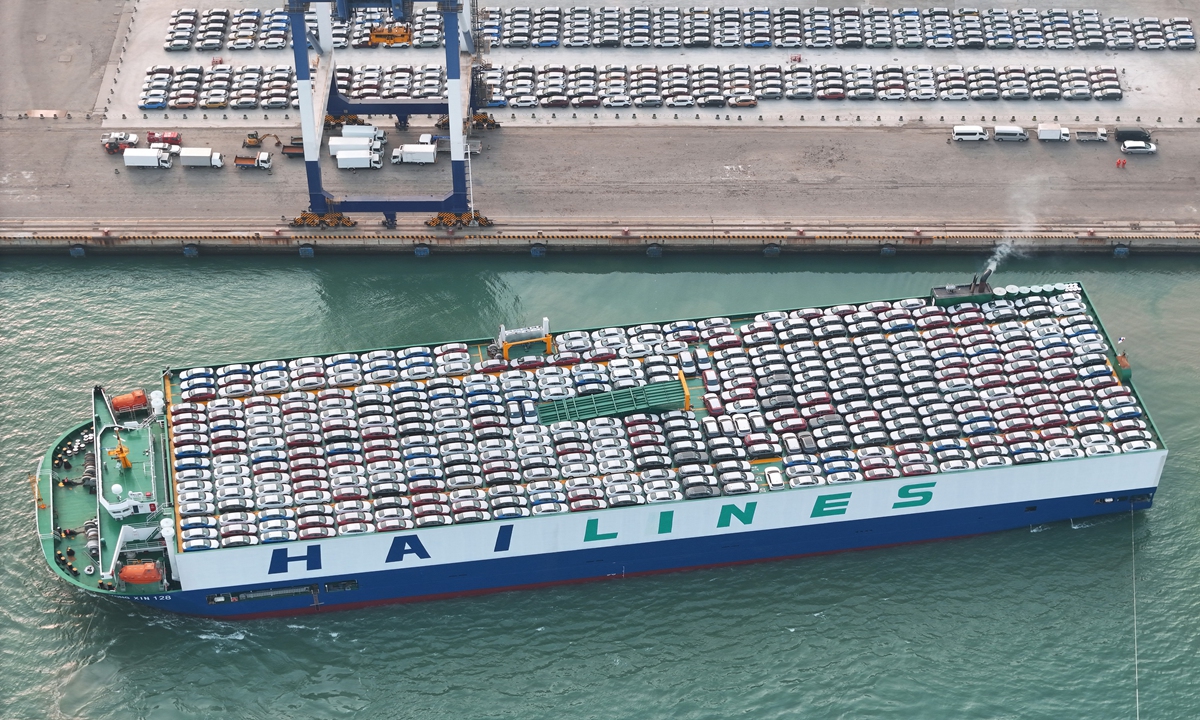Turkey’s decision to raise import duties on Chinese cars is protectionist, to hurt its customers: industry insider

A cargo ship loaded with vehicles for overseas markets departs from Yantai Port in East China's Shandong Province on March 11, 2024. In the first two months of the year, China exported 822,000 vehicles, a year-on-year increase of 30.5 percent, data from the China Association of Automobile Manufacturers showed. Photo: cnsphoto
Turkey's recent decision to impose an additional 40-percent tariff on vehicles imported from China is "unlikely to have a substantial impact" on Chinese auto industry, Cui Dongshu, secretary-general of the China Passenger Car Association, told the Global Times on Tuesday.
Cui noted that Chinese auto industry players are "competitive in terms of production and technology."
The Turkish government's decision, driven by protectionist considerations for its domestic auto industry, may not achieve the desired outcomes, Cui said. By levying extra tariffs on Chinese cars to support Turkey's own auto industry, the "anticipated benefits" may not materialize, and the additional costs could ultimately be passed on to the consumers in Turkey, Cui said.
Turkey plans to raise tariffs on all vehicles imported from China by 40 percent, in a bid to curb imports and narrow the current account deficit, and the decision will be effective after 30 days, according to a Bloomberg report on Saturday.
The additional tariff is set at a minimum of $7,000 per vehicle. The decision will be effective from July 7, according to media reports.
The Turkish government claimed that the move aims to "ensure consumer safety, protect market share of domestic production and reduce current account deficit" among other reasons.
The increase in import duty on Chinese vehicles is primarily due to Turkey's large trade deficit and the country's ongoing economic downturn, with the aim of boosting fiscal revenues, Cui told the Global Times.
And, Turkey is promoting the development of its own electric vehicle (EV) industry, as it sees the competitiveness of Chinese makers as a challenge, Cui said.
However, the protectionist move will only have a limited impact on Chinese car industry, Cui said.
Noticeably, the move came after Turkey raised tariffs on Chinese EV in March 2023 to bolster its first domestically-made EV.
Despite the tariff increase last year, Chinese car companies have performed well in Turkey, Cui said.
However, additional tariffs will impact Chinese car companies by increasing cost pressure and potentially slowing down the companies' overall growth rate. Nonetheless, given Turkey's significant trade deficit and underdeveloped auto industry, Chinese car companies should be able to overcome the challenges, Cui noted.
Due to Turkey's high manufacturing costs and lack of a modern, complete automotive manufacturing supply chain, Chinese cars, both gasoline-powered and electric, offer better value for local customers, Cui said.
While the Turkish government's intention is to protect domestic auto industry, ultimately, the consumers will vote with their wallets, Cui said, noting that it shouldn't be difficult for the consumers to choose between outdated, inexpensive home-made cars and imported high-value cars.
In Turkey, the automotive industry is relatively weak, with foreign brands occupying the majority of its market share. Foreign brands such as Volkswagen, Fiat and Ford all have set factories in Turkey. Chinese brands, including Chery and BYD also have a presence in the country.
Global Times

